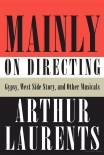Mainly on Directing, Arthur Laurents [best books for students to read TXT] 📗

- Author: Arthur Laurents
Book online «Mainly on Directing, Arthur Laurents [best books for students to read TXT] 📗». Author Arthur Laurents
Take its opening. The vitally important first ten minutes of a musical are the first challenge for the director. The opening musical number of Cage was obvious: the Cagelles singing “We Are What We Are” in drag in the nightclub called La Cage aux Folles. But was that how the show would open—with a stageful of drag queens in full fig? Hit the audience smack in the face? Get it over with and confront the unconverted—the enemy? I didn't think so. The purpose of the first minutes of any musical is not to challenge the audience but to hook it so firmly it will stay hooked for half the first act. Then you can challenge away.
The French movie we couldn't use had a visually alluring opening: skimming over the glistening night water of the Mediterranean toward the lights of a Riviera cabaret spelling out “La Cage aux Folles.” Effective: it made you want to go inside that club. Of course, that shot couldn't be duplicated in the theatre; but paradoxically, that was a blessing. The theatre, even the most kitchen-sink theatre with real running water from a tap, is illusion; if the movie opening could be simulated in theatre terms, no one could claim copyright violation. Simulated it was, and brilliantly, thanks to David Mitchell: a technical wizard, as a few scenic designers are; an artist, as a very few are; and a painter, which almost no one is.
As the orchestra played the overture (with Broadway-French touches like a Piaf accordion), the curtain rose on rose-hued buildings in perspective in a little plaza with the Riviera on the horizon. Lights glowed in windows as the buildings spun and parted to reveal the façade of a nightclub with “La Cage aux Folles” in lights. The buildings slid off, the club entrance rode downstage, and its doors opened to reveal gossamer white curtains. Then the icing on the magic cake of theatre: swirling white curtains billowed and spread out across the whole stage, with a LA CAGE sign glittering above it. Through the center of the parachute silk swept an elegant, tuxedoed Gene Barry, paradigm of the continental host, almost singing, “Mesdames et messieurs, welcome to La Cage aux Folles!” A punctuating chord from the orchestra and the audience went wild.
Was the idea not to prepare the unconverted for the drag queens to come? No, there was a hint: Gene Barry's wrist. He thought he was being continental as he flipped his palm in a welcoming gesture to the audience, but they knew better— particularly the men who had come only because of their wives. They were so impressed and glamorized, however, by the smoke and mirrors leading up to that wrist, they were glad they had come.
Gene Barry. What an unexpected journey we all take. Tom came to Boston for the last preview before we opened. It was a Friday night. He was complimentary; he appreciated all the smoke and mirrors. But fortunately for me, he wasn't fooled.
“You've done a wonderful job,” he said. “You know I never thought much of this thing, so I'm really amazed at the level you've brought it up to. But—” I braced myself—“it's not what you want it to be, because Gene Barry isn't any good.”
During rehearsals, everyone, myself included, had wanted to fire Gene, but we couldn't find anyone to replace him. It was extremely hard to find an American with the continental flair and the music-hall (vaudeville) style the role of Georges demanded. What made it harder was that the co-starring role of Albin (the wonderful George Hearn) was not only showier but had all the big numbers. Gene did have the vaudeville style, which is what had gotten him the part, but little else. A television series can be an unnoticed death to an actor's talents. But there had been no replacement to be found, and there still wasn't. I did what every director has to do in that fix: I worked hard and convinced myself Gene was getting better, Gene was becoming good, Gene was good. He was getting better, but he wasn't getting good.
I went into his dressing room before the Saturday matinee. He took one look at my look.
“No!” he said. “No! We're opening tonight!”
“Just listen to me.”
“No! I will not be upset!”
“You'll be panned if you don't.” He had moved to open the dressing-room door to kick me out but stopped. Gene was not a fool; he knew he was in trouble. “I can help you,” I said.
“You haven't done much so far,” he snapped.
“You go up on the feed line for every one of the few jokes George has. He's Irish. Next time, he'll punch you in the nose. I know why you do it, Gene. I understand. He has all the big numbers. But do what I say and I'll get you through tonight. Then I promise you we'll turn every one of those announcements of yours into an aria that will land like a musical number.” That wasn't bullshit. I believed it, so he did. “For tonight, whenever you're on stage with George, never look anywhere except into his eyes. Only three people will know you're looking at his forehead—you, George, and me. The audience will think you're looking





Comments (0)